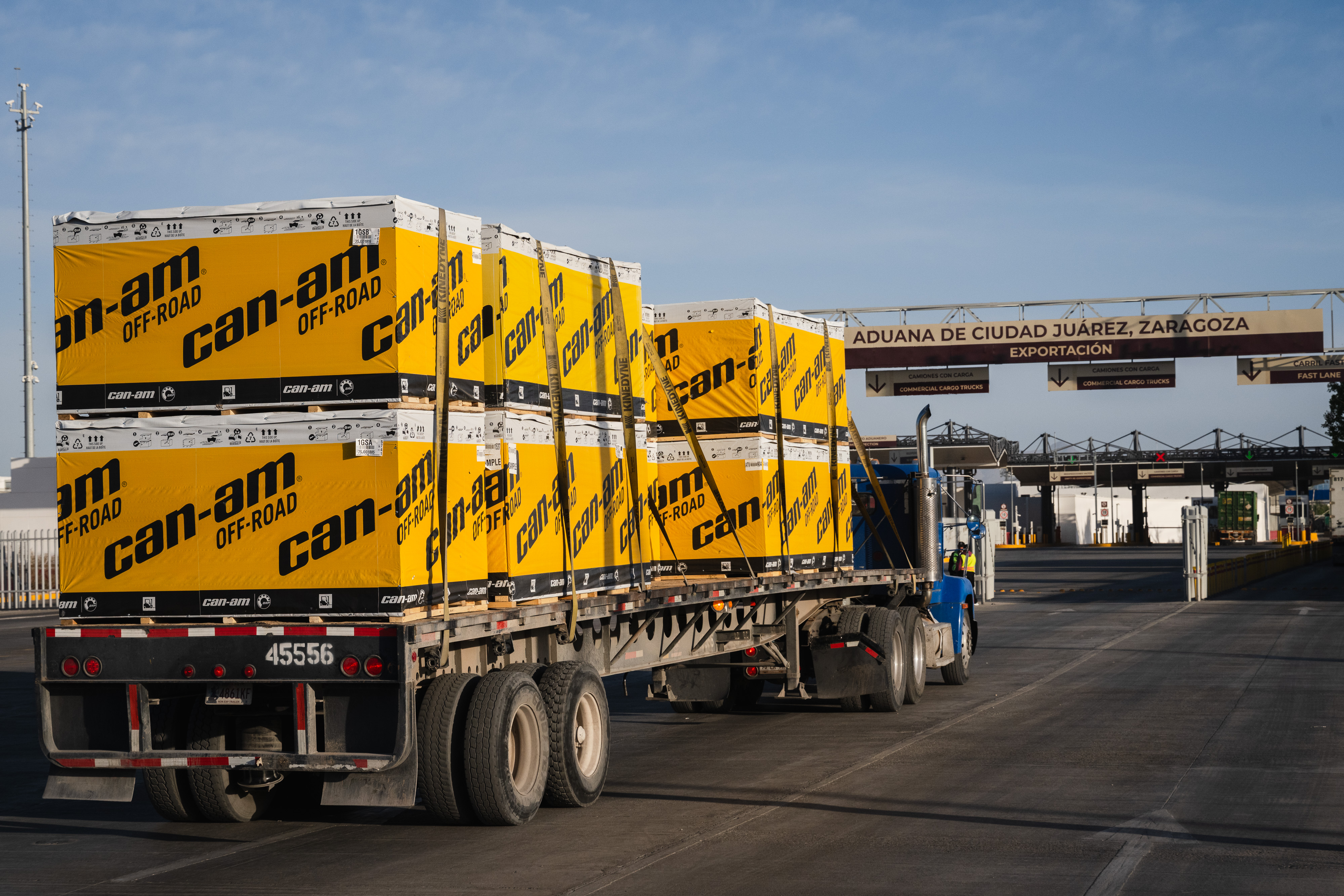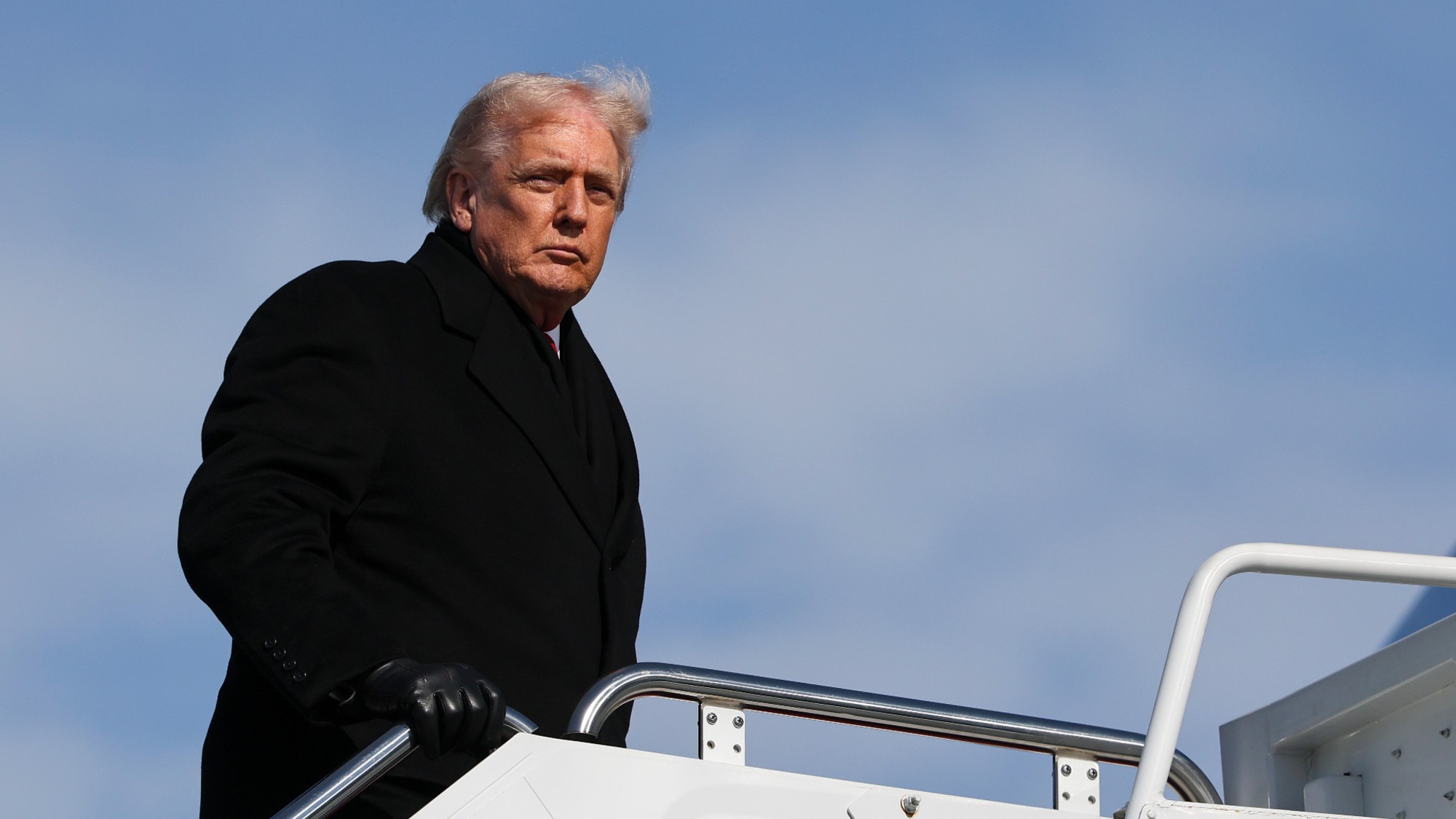Trump tariffs place trucking industry in the crosshairs
As the White House barrels ahead with its massive tariff project, American truckers are feeling the heat from a global trade war


As President Donald Trump's tariffs continue to wreak uneven havoc across the global economy, one industry has emerged as a bellwether for the ripple effect of the administration's levies: trucking. While not a direct target of Trump's sweeping tariff scheme, the trucking industry is nevertheless beginning to feel the pressures that come with a global trade paradigm experiencing massive upheaval. Individual drivers and fleet operators have started linking Trump's levies to their growing industrial challenges, while trucking analysts scramble to adapt.
A 'direct and disproportionate impact'
The "shifting landscape" of Trump's tariffs has created "uncertainty in the trucking sector," said Trucking Drive, an industry website. International tariffs "not only increase costs for equipment" for truckers, but could "potentially decrease demand for freight transportation" at large, said Jana Jarvis, the president and CEO of the Oregon Trucking Association, to the outlet. There is a fear that truckers "may not have job security in the future" should tariffs "lessen the flow of goods between America and its northern neighbor," said The Hill. While some truckers have experienced "reduced hours" in the wake of Trump's initial tariff announcement, others "haven't noticed much of a difference" in their traffic patterns.
"The longer tariffs last, the greater the pain for truckers as well as the families and businesses we serve," said American Trucking Associations President & CEO Chris Spear in a March statement. Tariffs will not only "reduce cross-border freight," but "also increase operational costs." Ultimately, the "100,000 full-time hardworking truckers hauling 85% of the surface trade in goods with Mexico and 67% of the goods traded with Canada" will be left to bear the "direct and disproportionate impact" of Trump's economic policy. In New Jersey, an "epicenter of major ports, airports, railway and interstate highways," tariffs could result in a "temporary dip in freight volumes coming through" at large, which has led to a "wait-and-see situation for the trucking community," said Lisa Yakomin, who heads New Jersey's Association of Bi-State Motor Carriers trade group, to NorthJersey.com.
The Week
Escape your echo chamber. Get the facts behind the news, plus analysis from multiple perspectives.

Sign up for The Week's Free Newsletters
From our morning news briefing to a weekly Good News Newsletter, get the best of The Week delivered directly to your inbox.
From our morning news briefing to a weekly Good News Newsletter, get the best of The Week delivered directly to your inbox.
'We need to align production with reduced demand'
“Heavy-duty truck orders continue to be negatively affected by market uncertainty about freight rates and demand, possible regulatory changes and the impact of tariffs," said Mack Trucks spokesperson Kimberly Pupillo to the Pennsylvania Capital-Star, after the company was forced to lay off several hundred employees at its operations center. While the company regrets "having to take this action," a representative said to CBS Philadelphia, the goal is to "align production with reduced demand for our vehicles." The Mack Trucks layoffs are "yet another consequence" of Trump's "disastrous" tariffs, said Jalopnik. And Mack isn't alone in its tariff-related troubles: the "entire industry is" affected.
That industry-wide uncertainty means that truck drivers "may slide over and try to move domestic product" rather than gamble on the future of international shipping, said Port of Los Angeles Executive Director Gene Seroka at Politico. Drivers will "have to scramble pretty quickly to keep their jobs and keep food on the table." It's "going to be disruptive."
A free daily email with the biggest news stories of the day – and the best features from TheWeek.com
Rafi Schwartz has worked as a politics writer at The Week since 2022, where he covers elections, Congress and the White House. He was previously a contributing writer with Mic focusing largely on politics, a senior writer with Splinter News, a staff writer for Fusion's news lab, and the managing editor of Heeb Magazine, a Jewish life and culture publication. Rafi's work has appeared in Rolling Stone, GOOD and The Forward, among others.
-
 The battle over the Irish language in Northern Ireland
The battle over the Irish language in Northern IrelandUnder the Radar Popularity is soaring across Northern Ireland, but dual-language sign policies agitate division as unionists accuse nationalists of cultural erosion
-
 Villa Treville Positano: a glamorous sanctuary on the Amalfi Coast
Villa Treville Positano: a glamorous sanctuary on the Amalfi CoastThe Week Recommends Franco Zeffirelli’s former private estate is now one of Italy’s most exclusive hotels
-
 How roadkill is a surprising boon to scientific research
How roadkill is a surprising boon to scientific researchUnder the radar We can learn from animals without trapping and capturing them
-
 Gavin Newsom and Dr. Oz feud over fraud allegations
Gavin Newsom and Dr. Oz feud over fraud allegationsIn the Spotlight Newsom called Oz’s behavior ‘baseless and racist’
-
 Greenland: The lasting damage of Trump’s tantrum
Greenland: The lasting damage of Trump’s tantrumFeature His desire for Greenland has seemingly faded away
-
 The price of forgiveness
The price of forgivenessFeature Trump’s unprecedented use of pardons has turned clemency into a big business.
-
 Democrats win House race, flip Texas Senate seat
Democrats win House race, flip Texas Senate seatSpeed Read Christian Menefee won the special election for an open House seat in the Houston area
-
 New Epstein files dump strains denials of elites
New Epstein files dump strains denials of elitesSpeed Read Fallout from the files has mostly occurred outside the US
-
 Will Peter Mandelson and Andrew testify to US Congress?
Will Peter Mandelson and Andrew testify to US Congress?Today's Big Question Could political pressure overcome legal obstacles and force either man to give evidence over their relationship with Jeffrey Epstein?
-
 The ‘mad king’: has Trump finally lost it?
The ‘mad king’: has Trump finally lost it?Talking Point Rambling speeches, wind turbine obsession, and an ‘unhinged’ letter to Norway’s prime minister have caused concern whether the rest of his term is ‘sustainable’
-
 A running list of everything Donald Trump’s administration, including the president, has said about his health
A running list of everything Donald Trump’s administration, including the president, has said about his healthIn Depth Some in the White House have claimed Trump has near-superhuman abilities
